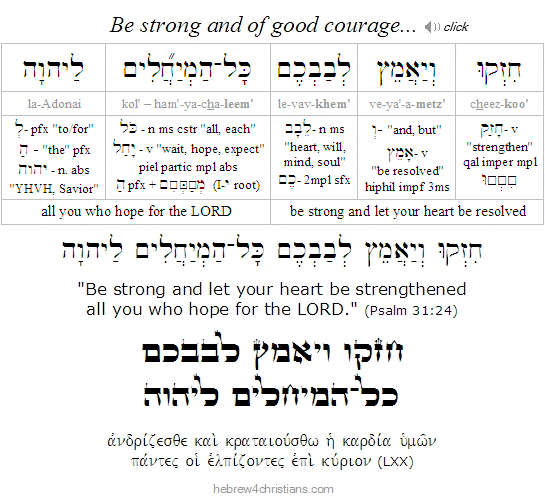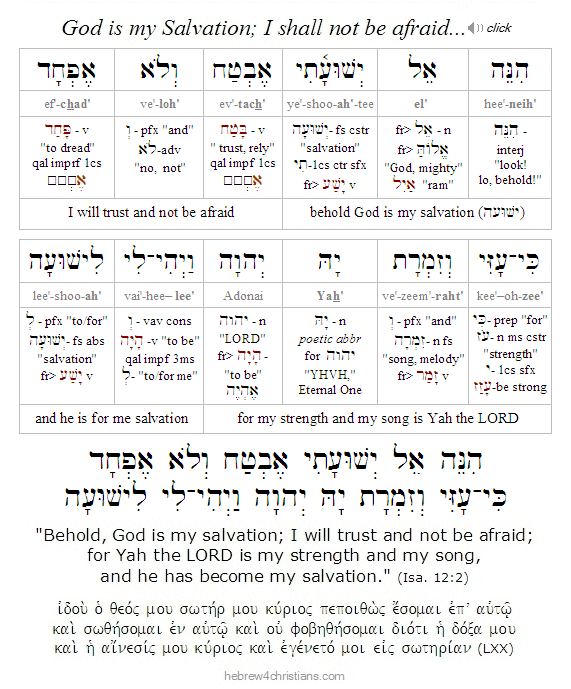|
February 2020 Updates (continued)
Note: If any page content appears to be missing, please refresh the page...
Heaven's Alphabet...
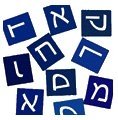
[ The following is related to this week's Torah reading, parashat Beshalach... ]
02.05.20 (Shevat 10, 5780) A verse from our Torah portion this week (i.e., Beshalach) contains all the letters of the Hebrew alphabet (i.e., aleph (א), bet (בּ), gimmel (ג), etc.). The special verse reads, "This is what the LORD has commanded: 'Gather of it, each one of you, as much as he can eat. You shall each take an omer (עמֶר), according to the number of the persons that each of you has in his tent'" (Exod. 16:16). Since this refers to the manna the Israelites were to collect for their daily bread, and this verse contains all the letters of the alphabet, we may poetically infer that if we immerse ourselves in the Scriptures, "from Aleph (א) to Tav (ת)," God will provide us with the "daily bread" (לֶחֶם חֻקֵּנוּ) we need, just as He did when the bread from heaven (לֶחֶם מִן־הַשָּׁמָיִם) was miraculously given to feed the Israelites in the desert. Therefore Yeshua, who is the Aleph and Tav, taught us to pray, "Give us this day our daily bread," which surely refers to the spiritual food (i.e., encouragement, hope, life) that we receive from the Word of Life (Deut. 8:3; Matt. 4:4).
Yeshua taught us: "Don't be anxious about tomorrow, for tomorrow has its own troubles. Live one day at a time" (Matt. 6:34). It makes no sense to worry about the future if the LORD is the Good Shepherd who tenderly watches over your way (Psalm 23:1). Every day we are given daily bread, but we must remember that manna could not be stored up without becoming rotten (Exod. 16:20). God's provision is "sufficient unto the day...."
Isn't it amazing how studying the Hebrew text reveals further insights into the Scriptures? Kotzo shel yod... And may you rest in the promise: "My God will supply every need of yours - "from A to Z" - according to his riches in glory in Yeshua the Messiah" (Phil. 4:19). He is lechem ha'chaim - the Living Bread from heaven (John 6:51)!
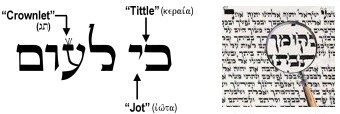 |
Stepping out in Faith...

02.05.20 (Shevat 10, 5780) From our Torah this week (i.e., Beshalach) we read how the children of Israel were trapped before the sea with no way of escape... Moses then cried out to God who told him to march forward -- right into the waters -- as the Pillar of Cloud settled between the people and Pharaoh's advancing army. According to a well-known midrash, when Moses lifted his staff to divide the sea, at first nothing happened. The people waited anxiously at the seashore, wondering what to do. Finally, Nachshon ben Aminadav, a descendant of Judah (Num. 1:7), waded into the water "up to his nose," and then the winds began blowing to divide the waters (Shemot Rabbah). The great miracle of kiryat yam suf (קרית ים סוף)- the splitting of the sea of reeds (the word "suf" means "reed,"see Exod. 2:3) therefore resulted because someone found real courage and took a step of faith: "And the people of Israel went into the midst of the sea on dry ground, the waters being a wall (חוֹמָה) to them on their right hand and on their left" (Exod. 14:22). They marched across the sea all that night (i.e., Nisan 21), under the light of the Shekhinah Glory...
The Talmud says "kasheh le'zavgom ke'kriat yam suf," which means it is more difficult for God to create a marriage than to split the sea. They reason this way because each person needs to take individual action to trust the other. Likewise with God. It is more difficult for God to get us to be in a genuine, trusting relationship with Him than it is for Him to split a sea. Of course the problem is not with God, who is the perfect "husband," but with our adulterous inner nature. It took the LORD a year to deliver Israel from Egypt, but it took Him 40 years to teach Israel to trust in His promises of love. God always awaits our teshuvah - our "answer" - to His invitation before He will reveal more to us. As Yeshua once said to his followers, "I still have many things to say to you, but you cannot bear them now" (John 16:12). Some things about God can only be known by stepping out in faith and surrendering ourselves to Him.
For more on this subject, see "Stepping out in Faith..."
Blessing of Adversity...

02.05.20 (Shevat 10, 5780) After the people finally left Egypt during the great Passover redemption, God hardened Pharaoh's heart yet again, inspiring him to entrap the Israelites before the shore of the Sea of Reeds. We read in our Torah: "When Pharaoh drew near, the people of Israel lifted up their eyes ... and cried out to the LORD" (Exod. 14:10). The sages comment that by pursuing them Pharaoh inspired the people to pursue the Presence of God, as evidenced by their heartfelt cry for deliverance. Indeed does not spiritual opposition and adversity inspire us to likewise call upon the Divine Presence? Therefore whenever we encounter oppression or hardship we should regard it as an invitation to come closer to God, as it says: "Let us then with confidence draw near to the throne of grace, that we may receive mercy and find grace to help in time of need" (Heb. 4:16). God rewards those who seek him (Heb. 11:6). Therefore "draw near to God and God will draw near to you" (James 4:8). The battle belongs to the Lord but our eyes must look to him for the victory. Remember that it is a blessing to fight the good fight of faith, since adversity shocks us out our lethal indifference and apathy, empowering us to call upon the Lord and overcome in His Name.
קָרְבָה אֶל־נַפְשִׁי גְאָלָהּ
לְמַעַן איְבַי פְּדֵנִי
ka·re·vah · el-naf·shee · ge·a·lah
le·ma'·an · o·ye-vai · pe·dei'·nee

"Draw near to my soul, redeem me;
deliver me because of my enemies." (Psalm 69:18)

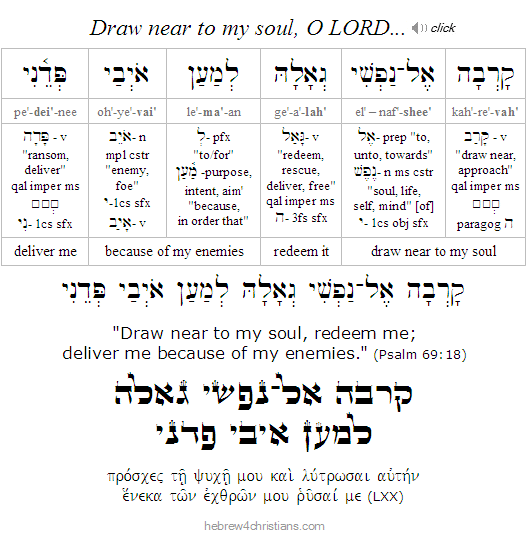
The Great Tree of Life...
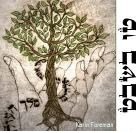
[ The holiday of Tu B'Shevat is observed Sunday, Feb. 9th this year... ]
02.05.20 (Shevat 10, 5780) The Torah alludes that human life is like "the tree of the field," i.e., כִּי הָאָדָם עֵץ הַשָּׂדֶה, Deut. 20:19), and many people therefore observe Tu B'Shevat as time to assess man's place within creation as well. Since God created the world for a habitation (Isa. 45:18), some have pictured the world itself as a "great tree" with human beings as its fruit. Indeed, Yeshua often used such agricultural images in his parables. For example, he explained that people are known by the "fruits" of their lives (Matt. 7:16-20). He likened the spread of his message in terms of "sowing and reaping" (Matt. 13:3-23) and compared the Kingdom of Heaven to the secret working of a mustard seed (Matt. 13:31-32). Yeshua regarded the world as a "field" for planting with different "types of soil" (Matt. 13:38-43), and warned of the "great harvest" of souls at the end of the age (Luke 10:2; Matt. 13:30). He pointed to signs from a fig tree to indicate the nearness of the prophesied End of Days (Matt. 24:32-33). Yeshua also used the metaphor of a "vine and its branches" to explain how his followers are to be connected to Him (John 15:1-6).
For more on this subject, see "The Torah of Trees: Further thoughts on Tu B'Shevat."
Transforming our Minds...
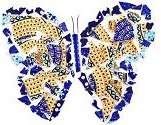
02.05.20 (Shevat 10, 5780) The Scriptures counsel us to be transformed (μεταμορφόω) by "renewing our minds" (Rom. 12:2), though just how we are to do this remains an open question. Our perspectives and attitudes are shaped by our assumptions about life, many of which are "preconscious" or hidden from our awareness. Habitual thoughts, biases, prejudices, fears, etc., all affect (and distort) the way we see and understand reality. In light of this, how can we change? How can we overcome our habitual negativity, misery, and general unhappiness? How do we develop right thinking power? How do we learn to apply our minds to perceive the good, instead of responding in unreflective and negative ways to our circumstances? How do we discipline our will so that "if there is anything worthy of praise, think about these things" (Phil. 4:8)? Surely we cannot transform ourselves, for we are the source of our own impairment; we are the patient who needs the cure....
Healing comes from receiving the light of truth, being "single-minded," with our eyes focused on what is real. "If your eye is "single" (i.e., ἁπλοῦς, sincere, focused)," Yeshua said, "your whole body will be filled with light" (Matt. 6:22). We are to "renew" (ἀνακαινόω) our minds, which means elevating our thinking by focusing on God. Likewise the Torah commands: "You shall be made whole (i.e., tamin: תָּמִים) with the LORD your God" (Deut. 18:13). We are made "whole" or "perfect" (i.e., complete) when we resolutely turn to God for healing of our inner dividedness, as it says: "The Torah of the LORD is perfect (תָּמִים), returning the soul" (Psalm 19:8). And where it is written, "Let us hear end of the matter: Fear God and love his commandments, the text adds: ki zeh kol-ha'adam (כִּי־זֶה כָּל־הָאָדָם), "for this is the whole man," suggesting that those who return will be healed of their double-mindedness (Eccl. 12:13). Ultimately we are made whole when we are united to God in Messiah, for then we are "with the LORD our God" and the Spirit writes Torah within the heart of faith (Jer. 31:33).
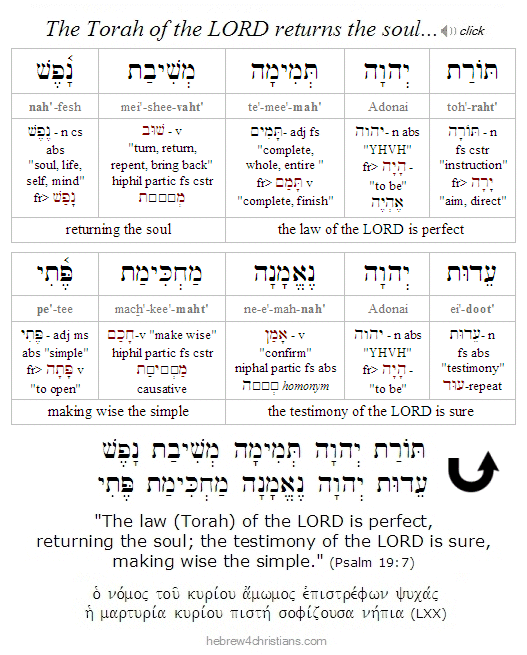 |
Believing and Seeing...
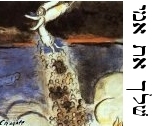
02.04.20 (Shevat 9, 5780) This week's Torah portion (parashat Beshalach) contains some of the most dramatic episodes recorded in all of the Scriptures. Here we read about the great exodus of the Israelites on the day of Passover and Pharaoh's last-ditch pursuit of the Hebrew slaves. We read how the Shekhinah Glory held back Pharaoh's host, how the LORD split the Sea of Reeds so that the Israelites could safely pass through the waters, and how Pharaoh's forces were all drowned in the sea. We further read how God personally led the Israelites into the desert and sustained them by transforming "bitter water" into sweet water, sending manna from heaven, and providing a miraculous water source from the rock that Moses struck. Yet despite all the miracles and wonders performed on behalf of the Israelites, the people inexplicably seemed to "forget" about their miraculous redemption. Indeed, it was just a few days after the awe-inspiring deliverance from Egypt that the people began to murmur, complain, and kvetch. The sorry state of the Israelites was so bad that the Midrash Rabbah plaintively wonders how it was possible that the Israelites could have so quickly forgotten all of God's miracles performed on their behalf....
The story of the disgruntled Israelites teaches us that miracles are never enough to sustain our faith. Seeing isn't believing, but rather the other way around.... This explains why those church groups that emphasize "signs and wonders" often contain so many exhausted people. Miracles are insufficient for faith; people get excited about them while they occur, but they soon forget them and return to a state of desperation and despair. Necessarily the cycle must repeat itself, with ever-increasing claims of the miraculous, in order to keep the illusion alive.... In light of this, it is wise to consider that the passion for "signs and wonders" may be little more than a counterfeit for the real need to surrender and serve God. After all, truly loving the LORD with all your heart, with all your soul, and with all your strength is the goal of faith. A heart of true faith, then, is a miracle of a greater kind than that of splitting the sea!
Regarding the case of the redeemed Israelites, what has struck some commentators is not so much the incredible signs and wonders that the LORD performed on behalf of Israel, but rather the people's persistent inability or unwillingness to believe... Some of the Jewish sages have gone so far as to say that the entire Bible may be read as a book about God's apparent inability to teach the Jewish people how to be grateful. The same might be said about some professing Christians we see today.
Lasting transformation of the heart comes from "following" the LORD God of Israel. As I've mentioned elsewhere, disciples of Yeshua are called talmidim (תַּלְמִידִים) -- a word that comes from lamad (לָמַד) meaning "to learn" (the Hebrew word for teacher is melamad (מְלַמֵּד) from the same root). In the Greek New Testament, the word for "disciple" is μαθητής (the word "math" comes from this), that is, a pupil of a διδάσκαλος, or a teacher. In other words, disciples of Yeshua are automatically "enrolled" in the school of truth, which is also a "school of suffering" (Col. 1:24). In the Torah the "daily sacrifice," or korban tamid (קָרְבַּן תָּמִיד), was offered to the LORD every morning and evening upon the altar, which corresponds to being a "living sacrifice" (i.e., korban chai: קָרְבָּן חַי) to the LORD (Rom. 12:1-2). We must take up our cross daily (Luke 9:23). Yeshua plainly said: "For this purpose I was born and for this purpose I have come into the world -- to bear witness to the truth. All who are of the truth listen to my voice" (John 18:37). It is hard to imagine a follower of Yeshua who does not love, study, and value the truth...
רֵאשִׁית חָכְמָה קְנֵה חָכְמָה
וּבְכָל־קִנְיָנְךָ קְנֵה בִינָה
rei·sheet · choch·mah · ke·neih · choch·mah
oo·ve·khol-keen·ya'·ne·kha · ke·neih · vee·nah

"The beginning of wisdom is this: Get wisdom,
and whatever you get, get insight." (Prov. 4:7)
Download Study Card

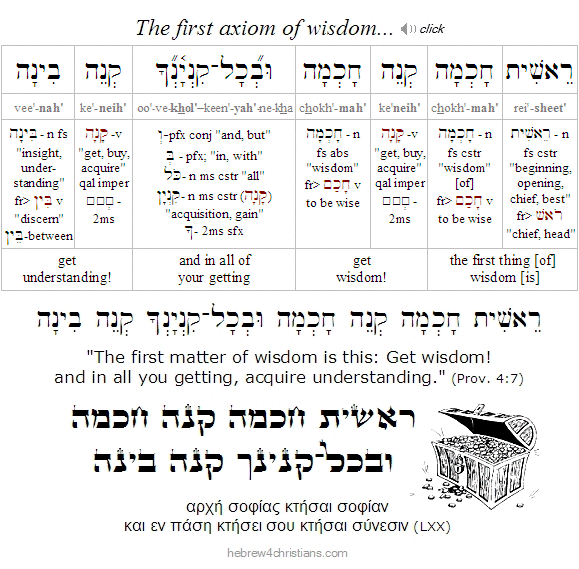
The Hebrew word for education is chinukh (חִנּוּךְ), a word that shares the same root as the word for "dedication" (i.e., chanukah: חֲנֻכָּה). True education of the Scriptures is therefore foundational to being a student of the Messiah. We are called to "rightly divide" (ὀρθοτομέω, lit. "cut straight") the "word of truth (2 Tim. 2:15). Among other things, then, following Yeshua means becoming a student of the Jewish Scriptures that He loved and fulfilled (Matt. 5:17-18; Luke 24:44-45). Only after learning from Yeshua as your Teacher will you be equipped to "go to all the nations and teach" others (Matt. 28:19). This is accomplished not merely by explaining (propositional) doctrine but by kiddush HaShem -- sanctifying the LORD in our lives (1 Pet. 1:15-16). As the sages noted long ago: "Upon three things the world does stand: upon the Torah (truth), upon worship, and upon acts of lovingkindness" (Avot 1:2). We are called to be a "living letter" sent to the world to be "read" (2 Cor. 3:2-3).
It has been said that it was easier for the LORD to get Israel out of Egypt than it was for Him to get Egypt out of Israel... The LORD knew the process would be an arduous one, requiring 40 long years of study in the desert under the instruction of Moses, and yet despite all this the people "were unable to enter because of unbelief" (Heb. 3:19; 4:11; Psalm 95:7-11). This is a truly sobering warning, and we are encouraged to open our hearts to the miracle of God's love for us. "Today, if you hear His voice, do not harden your hearts." May it please God to help us make a new commitment to study and to live the truth of the Torah and Scriptures for the glory of His Name.
The Fruit of our Words...

[ The following is related to Tu B'Shevat, or the "new year" for trees, a holiday that provides opportunity for us to reflect on the idea of fruitfulness and the fruit of the Spirit in our lives... ]
02.04.20 (Shevat 9, 5780) Yeshua said that as a tree is to its fruit, so is a person's heart is to his speech. Our words arise from an underlying source and root: "I tell you, on the Day of Judgment people will give account for every careless word (πᾶν ῥῆμα ἀργὸν) they speak, for by your words you will be justified, and by your words you will be condemned" (Matt. 12:36-37). First note that the phrase translated "every careless word" can be understood as "every 'workless' word," that is, every vain or empty word spoken, every broken promise, every insincere utterance, and so on. Second, note that there is a relationship between naming and being in Hebrew thought, and indeed the Hebrew word davar (דּבר), usually translated as "word," can also mean "thing." This suggests that our words define reality - not in an absolute sense, of course - but in terms of our perspective and attitude, and for that we are held responsible before the LORD. Since our words express our thoughts, Yeshua wants us to make up our minds: "Either make the tree good and its fruit good, or make the tree bad and its fruit bad, for the tree is known by its fruit" (Matt. 12:33).
Listen to the words of your heart and understand that they are devarim (דְּבָרִים) "things" that are defining the course of your life right now. Our thoughts and words "exhale" the breath of God that was given to each of us. In a very real sense they serve as "prayers" we are constantly offering.... And may it please our gracious and long-suffering LORD to answer the cry of our heart: "Let the words of my mouth and the meditation of my heart be acceptable in your sight, O LORD, my Rock and my Redeemer." Amen.
יִהְיוּ לְרָצוֹן אִמְרֵי־פִי
וְהֶגְיוֹן לִבִּי לְפָנֶיךָ יְהוָה צוּרִי וְגאֲלִי
yee·yoo · le·ra·tzon · eem·rei-fee
ve·heg·yohn · lee·bee · le·fa·ney'·kha · Adonai · tzoo·ree · ve·go·a·lee

"Let the words of my mouth and the meditation of my heart
be pleasing to You, O LORD, my Rock and my Redeemer."
(Psalm 19:14)
Hebrew Study Card

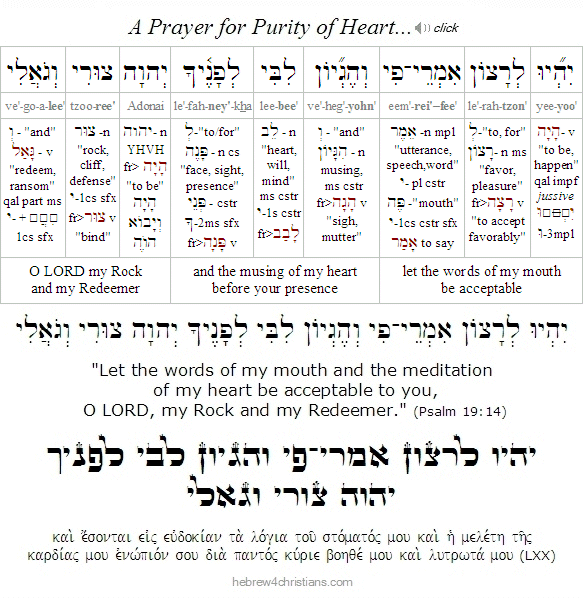
Courage for the Battle...
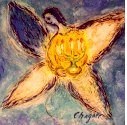
02.04.20 (Shevat 9, 5780) "Be of good courage, and let your heart be strengthened, all you that hope in the LORD" (Psalm 31:24). This is a timeless word, spoken from the heart of the Eternal. Even if you have recently fallen or sinned, regard your struggle to find hope as the invitation to draw closer to God. Begin again, every day, every hour... Teshuvah (תְּשׁוּבָה) means means lifting up your heart in courage before heaven and trusting that God is for you, upholding your way in the struggle (Psalm 37:23-24). Whoever is called by God must endure fearsome battles - "the hordes of troops and the sounds of war horns." You must stand firm despite the momentary adversity: "let not your heart faint; do not fear or panic or be in dread... for the LORD your God is he who goes with you" (Deut. 20:3-4). Faith expresses hope in the Reality, Substance, and Being (ὑπόστασις) of the unseen and is made captive to undying hope (Heb. 11:1). Therefore the Spirit cries: "Wait (i.e., hope) for the LORD; be steadfast and he will strengthen your heart; and (again) wait for the LORD."
קַוֵּה אֶל־יְהוָה חֲזַק וְיַאֲמֵץ לִבֶּךָ
וְקַוֵּה אֶל־יְהוָה
ka·veih · el · Adonai · cha·zak · ve·ya·metz · lee·be'·kha
ve-ka·veih · el-Adonai

"Wait for the LORD: be steadfast and he will strengthen your heart;
and again, wait for the LORD." - Psalm 27:14
Download Study Card

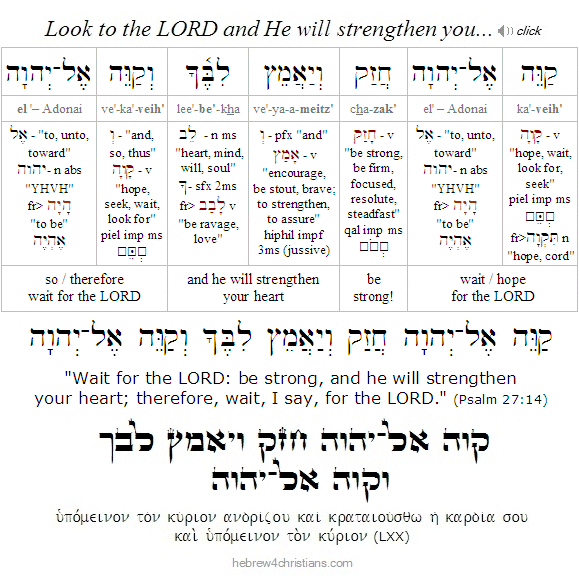
In this verse, the imperative verb often translated as "wait" is the Hebrew word kaveh (קַוֵּה), which is better rendered as "look for with anticipation!" or "hope!" (the same root appears in the Hebrew word for hope, i.e., tikvah: תִּקְוָה). Therefore hope in the Lord and "chazak!" - be strong! (the Septuagint translates chazak as "andridzou" (ἀνδρίζου - act like a man!). Note that the verb ve'yametz is a causal active stem (i.e., Hiphal) in the "jussive mood," which means it is imperative – "command your heart to be strengthened," or "let your heart be made strong!" That is, make the decision to be strong in the LORD, and the LORD will give you strength to bear your present suffering: "Look to the LORD (קַוֵּה אֶל־יְהוָה) and find hope." Amen. God will help us, and he will help us before he will help us!
Heaven's Love Story...
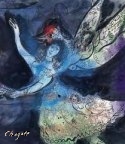
02.03.20 (Shevat 8, 5780) The Scriptures reveal that ultimate reality is a divine love story with a "happy ending," despite the struggles we face in this world. We see this in connection with the great deliverance of the Passover, when we read the story of our redemption in the Torah, summarized in a special book called a "haggadah." Note that the Hebrew word "haggadah" (הַגָּדָה) means "retelling," which of course refers to the story of our journey from slavery to freedom by the hand of God's love. With regard to the sanctity of this story, the Torah commands us: "You shall tell (i.e., ve'heegadta: וְהִגַּדְתָּ, from which "haggadah" comes) your child on that day, 'It is because of what the LORD did for me when I came out of Egypt.' And it shall be to you as a sign on your hand and as a memorial between your eyes, that the Torah of the LORD may be in your mouth. For with a strong hand the LORD has brought you out of Egypt" (Exod. 13:8-8). The sages note that the numeric value of the word "haggadah" (הַגָּדָה) is the same as the word for "good" (i.e., tov: טוֹב), which again indicates that the story of our redemption in the Messiah is truly good – indeed, the greatest story ever told.
מָה־אָשִׁיב לַיהוָה כָּל־תַּגְמוּלוֹהִי עָלָי
כּוֹס־יְשׁוּעוֹת אֶשָּׂא וּבְשֵׁם יְהוָה אֶקְרָא
mah · a·sheev · la'donai · kol-tag·moo·lo·hee · a·lai?
kos · ye·shoo·oht · e·sa' · oov·shem · Adonai · ek·ra'

"What shall I render to the LORD for all his benefits to me?
I will lift up the cup of salvation, and call upon the name of the LORD."
(Psalm 116:12-13)
Hebrew Study Card

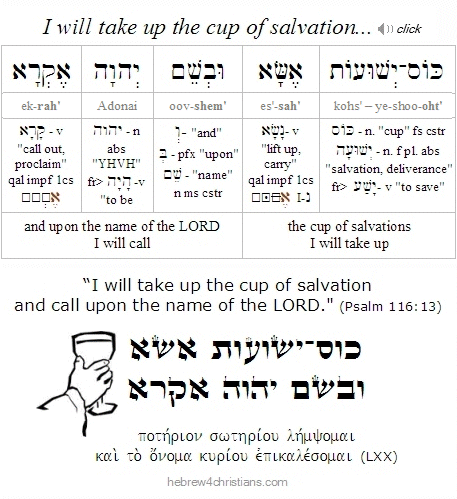
The Torah of Trees...

[ Sunday Feb. 9th at sundown begins "Tu B'Shevat," or the 15th of the month of Shevat (שְׁבָט), which marks the traditional date celebrating the "New Year" for Trees... ]
02.03.20 (Shevat 8, 5780) The Bible begins and ends with the great Tree of Life -- first in the orchard of Eden, and later in the midst of the paradise of heaven. "The Tree of Life (i.e., etz ha' chayim: עֵץ הַחַיִּים) was in the midst of the garden..." (Gen. 2:9); "Then the angel showed me the river of the water of life, bright as crystal, flowing from the throne of God and of the Lamb through the middle of the street of the city; also, on either side of the river, the Tree of Life (etz ha-chayim) with its twelve kinds of fruit, yielding its fruit each month" (Rev. 22:1-2). Notice that the "twelve fruits" (καρποὺς δώδεκα) from the Tree of Life are directly linked to the "twelve months" of the Jewish year (κατὰ μῆνα ἕκαστον ἀποδιδοῦν τὸν καρπὸν αὐτοῦ: "each month rendering its fruit"). Twelve months; twelve fruits.... This teaches us that the sequence of the holidays (moedim) was intended to teach us revelation about God. That is why God created the Sun and the Moon for signs and for "appointed times" (Gen. 1:14), as it also says: "He made the moon to mark the appointed times (לְמוֹעֲדִים); the sun knows its time for setting" (Psalm 104:19).
The Scriptures state twice: "Take root downward and bear fruit upward" (2 Kings 19:30; Isa. 37:31). As Yeshua said, "unless a grain of wheat falls to the ground and dies, it abides alone; but if it dies, it brings forth much fruit (John 12:24). We pray we might surrender ourselves to the Lord fully, being immersed in His passion, "bearing fruit in every good work (ἐν παντὶ ἔργῳ ἀγαθῷ καρποφοροῦντες) and growing in da'at HaShem (דַעַת אֱלהִים) - the knowledge of God" (Col. 1:10). The "fruit of the righteous is a Tree of Life" lit., etz chayim (עֵץ חַיִּים), literally, "the Tree of lives" (Prov. 11:30). It is the fruit of Yeshua, the Tzaddik of God, the Righteous One, who bears fruits of healing in the lives of those who turn to Him in trust...
יְהִי רָצוֹן מִלְּפָנֶיךָ יהוה אֱלהֵינוּ וֵאלהֵי אֲבוֹתֵינוּ
שֶׁתְּחַדֵּשׁ עָלֵינוּ טוֹב וּפוֹרֶה שָּׁנָה
בַּאֲדנֵינוּ יֵשׁוּעַ הַמָּשִׁיחַ, אָמֵן
ye·hee · ra·tzon · meel·fa·ney'·kha · Adonai · E·lo·hey'·noo · ve·lo·hey · a·vo·tey'·noo
she·te·cha·desh · a·ley'·noo · tov · oo·fo·reh · sha·nah
ba·a·do·ney'·noo · Ye·shoo'·ah · ha·ma·shee'·ach · a·men

"May it be Your will, LORD our God and God of our fathers,
that you renew for us a good and fruitful year
in our Lord Yeshua the Messiah. Amen."

Download Study Card
The "Tree of Life" (i.e., etz ha'chayim: עֵץ הַחַיִּים) is mentioned ten times in Scripture, corresponding to the "ten words of God" (i.e., the Ten Commandments). In the Torah it first appears in the center of the paradise of Eden (Gen. 2:9; 3:22-4), but it is soon lost to humanity because of Adam's transgression. In the book of Revelation, it reappears in the center of the Paradise of God (Rev. 2:7, 22:2), resurrected on account of the faithful obedience of Yeshua as mankind's "last Adam" (1 Cor. 15:45). Those who have washed their robes by means of His righteousness are given access to this Tree in the heavenly Jerusalem (Rev. 22:14). The paradise lost by Adam has been regained by the greater ben-adam, the Son of Man, Yeshua the Messiah, the Savior of the children of men...
Note: For more information about Tu B'Shevat, see:
Parashat Beshalach - בשלח

[ In our Torah portion this week, the waters of the Red Sea divide to make a path for the Israelites, a miracle that symbolized newness of life as God's liberated people... ]
02.02.20 (Shevat 7, 5780) Last week's Torah portion (parashat Bo) described how the Israelites were finally released from Egypt after God delivered the final plague during the time of Passover. In this week's portion, the Israelites began their journey home, after 430 years of exile. Instead of leading them along a direct route to the Promised Land, however, God directed them south, toward the desert, where the Glory of God appeared as a Pillar of Cloud by day and as a Pillar of Fire by night to lead them on their way. When Pharaoh heard that the Israelites were at the border of the desert, however, he perversely decided to pursue them and bring them back to Egypt. God then redirected the Israelites to camp near the edge of the Sea of Reeds, where the Egyptian army finally caught up with them. Dramatically, the Israelites were caught between the sea on one side, and Pharaoh's army on the other...
The terrified people then began to blame Moses for their predicament. Moses reassured them of God's final deliverance and raised his staff to miraculously divide the waters of the sea. All that night the Shekhinah Glory enshrouded the Egyptian army but gave light to Israel as the people crossed through the sea on dry ground. Just before dawn, the dark pillar of cloud that veiled the Egyptian army lifted, and the soldiers immediately rushed after the Israelites into pathway of the sea. God then told Moses to lift his staff again so that the waters would overwhelm the Egyptians with their chariots and horsemen. By the time dawn arrived, the Israelites saw the dead bodies of Pharaoh's army lining the seashore.
Moses and Miriam then led the people of Israel in a spontaneous hymn of thanks and praise to God for their complete deliverance from Pharaoh, which is often called the "Song of the Sea" (i.e., shirah hayam). The song begins, "The Lord is my strength and song, and he is become my salvation" / עָזִּי וְזִמְרָת יָהּ וַיְהִי־לִי לִישׁוּעָה (Exod. 15:2, cp. Isa. 12:2). For Orthodox Jews, singing Shirat Hayam every day is thought to fulfill the biblical commandment to "remember the day of your departure from the land of Egypt as long as you live" (Deut. 16:3). Note that Shirat Hayam is also sung on the 7th day of Passover, as a memorial of the deliverance by God through the waters of the Sea of Reeds.
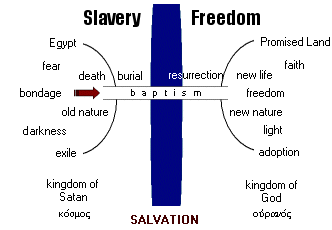 |
The great message of our deliverance resounds throughout Jewish history, and indeed it is regarded as a theme of the faithful love of LORD for His people:
הִנֵּה אֵל יְשׁוּעָתִי אֶבְטַח וְלא אֶפְחָד
כִּי־עָזִּי וְזִמְרָת יָהּ יְהוָה
וַיְהִי־לִי לִישׁוּעָה
hee·nei · el · ye·shoo·a'·tee · ev·tach · ve·lo · ef·chad
kee-o·zee · ve·zeem·raht · Yah · Adonai
vai·hee-lee · lee·shoo·ah

"Behold, God is my salvation; I will trust, and will not be afraid;
for the LORD God (יָהּ יְהוָה) is my strength and my song,
and he has become my salvation."
(Isaiah 12:2)
Click to listen and learn the Hebrew:
After their jubilation, the narrative resumes as God led the people away from the sea, into the desert of Sin (מִדְבַּר־סִין), a desolate region about midway to Mount Sinai. After traveling three days without finding any water, however, the people complained and God provided them with fresh water at Marah. Awhile later, the matzah the people had brought with them ran out and God tested their obedience by giving them "bread from heaven" (i.e., manna). The portion ends with the Amalekites' surprise attack of Israel at Rephidim, near Mount Sinai, and the introduction of Joshua as the leader of the army of Israel.
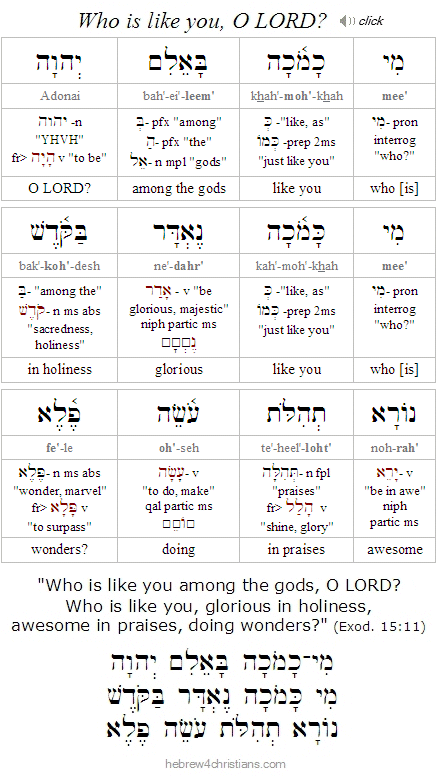 |
Shabbat Shirah - שַׁבַּת שִׁירָה
Because of the critical significance of the miracle of crossing the sea, this Sabbath is called Shabbat Shirah, the "Sabbath of the Song," because it includes the song of deliverance sung by Moses and Miriam after the people made safe passage to new life. The "Song of the Sea" (i.e., shirah hayam) begins, "The Lord is my strength and song, and he is become my salvation" / עָזִּי וְזִמְרָת יָהּ וַיְהִי־לִי לִישׁוּעָה (Exod. 15:2, cp. Isa. 12:2). For Orthodox Jews, singing Shirat Hayam every day is thought to fulfill the biblical commandment to "remember the day of your departure from the land of Egypt as long as you live" (Deut. 16:3). Note that Shirat Hayam is also sung on the 7th day of Passover, as a memorial of the deliverance by God through the waters of the Sea of Reeds.
|


















